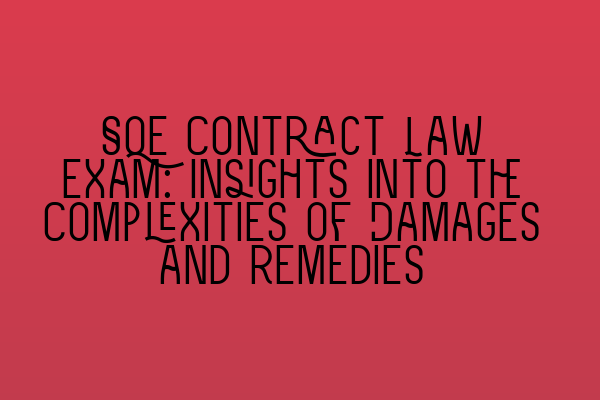SQE Contract Law Exam: Insights into the Complexities of Damages and Remedies
Welcome to another exciting blog post from SQE Contract Law! In today’s article, we will dive deep into the complex world of damages and remedies in contract law, giving you valuable insights to help you prepare for your SQE Contract Law exam. So, let’s get started!
The Importance of Damages and Remedies
When a contract is breached, it is essential to understand the various options available to the injured party. Damages and remedies play a crucial role in providing compensation and enforcing contractual obligations. By understanding these concepts, solicitors can effectively advise their clients on the best course of action.
1. Damages: Damages are a monetary award that aims to compensate the injured party for losses suffered due to the breach of contract. There are different types of damages, including:
- Compensatory Damages: These aim to put the injured party in the position they would have been in had the contract been performed.
- Consequential Damages: These are damages that arise as a result of the breach and are reasonably foreseeable.
- Liquidated Damages: Parties may agree in advance on a specific amount of damages to be paid in case of a breach, providing certainty.
- Nominal Damages: When a breach occurs, but no actual loss or damage is suffered, the injured party may still be entitled to nominal damages.
Damages are an important consideration, as they provide a legal remedy to compensate for financial losses incurred as a result of a breach of contract.
2. Remedies: In addition to damages, various remedies are available to the injured party, depending on the circumstances. These remedies aim to rectify the breach and restore the injured party to their rightful position. Some common remedies include:
- Specific Performance: This remedy compels the breaching party to fulfill their contractual obligations as originally agreed.
- Injunction: In certain cases, the court may grant an injunction to prevent one party from undertaking a particular action or to compel a specific action.
- Rescission: Rescission allows the injured party to cancel the contract and seek restitution, effectively undoing the contractual relationship.
- Reformation: Reformation allows the court to modify the terms of the contract to make it enforceable.
Each remedy has its own requirements and considerations, and it is essential for solicitors to understand when and how to utilize them effectively.
Preparing for the SQE Contract Law Exam
Now that you understand the complexities of damages and remedies in contract law, it’s time to prepare for your SQE Contract Law exam. Here are a few tips:
1. Master the Legal Principles: Familiarize yourself with the key legal principles, statutes, and case law relevant to damages and remedies. Understand the elements required to claim different types of damages and the conditions for specific remedies.
2. Practice Case Analysis: Work on analyzing contract law cases involving damages and remedies. Train yourself to identify relevant facts and legal issues, and develop the ability to apply legal principles to solve complex problems.
3. Study Exam Resources: Make use of available exam resources, such as past papers, study guides, and online forums. These resources can provide invaluable insight into the exam format, commonly tested topics, and effective study strategies.
4. Seek Mentorship: Consider seeking mentorship from experienced solicitors or professionals who have expertise in contract law. Their guidance can help you navigate the complexities of damages and remedies and provide valuable insights into the practical application of legal principles.
By following these tips and dedicating sufficient time to study and preparation, you can confidently approach the SQE Contract Law exam and excel in your performance.
For more information on pursuing a career in law, related legal topics, and helpful resources, check out these articles:
- Exploring Solicitor Salaries in the UK: Average Earnings and Factors Affecting Income
- Securing Training Contracts: A Roadmap to Becoming a Solicitor
- Mentorship for Aspiring Solicitors: Nurturing Talent in the Legal Field
- Legal Challenges and Pitfalls: Navigating the Complexities of the Legal System
- The GDL (Graduate Diploma in Law): A Pathway to Becoming a Solicitor
Thank you for reading our comprehensive guide on damages and remedies in contract law. We hope you found it insightful and informative. Good luck with your SQE Contract Law exam and your future career as a solicitor!
